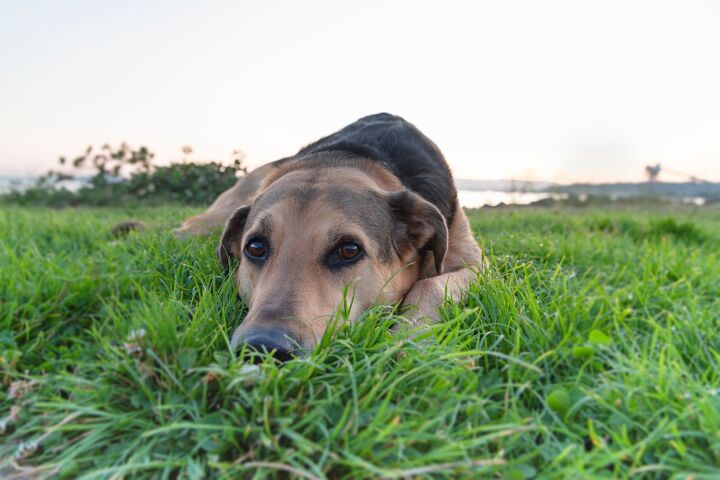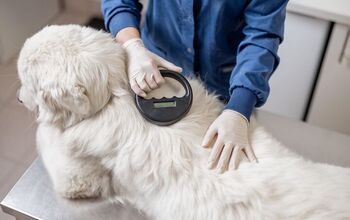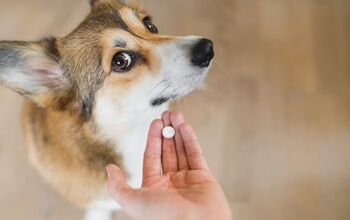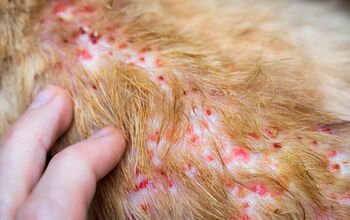Intestinal Worms in Dogs: Types and Symptoms

Although an unpleasant topic to think about, the harsh reality is that worms are a common problem in dogs – one that you need to know how to tackle and prevent. So, we’ve put together a short guide on some of the canine intestinal worms you should know about, the symptoms they can cause, and the treatments that can get rid of them. With this knowledge, you’ll be able to more easily recognize the signs of a worm infestation in your dog, and you’ll know how important it is to prevent worms from infecting your companion.
4 Intestinal Worms That Infect Dogs
Here are brief descriptions of worms that commonly infect dogs.
Note: Some worms that affect dogs can be transmitted to humans.
Tapeworms
More than one type of tapeworm can infect a dog’s small intestine. These worms make their way into the intestine’s wall, where they grow long, segmented bodies.
Dogs could end up with tapeworms after consuming infected adult fleas or wild animals, such as rodents. So, try to prevent your dog from eating wildlife, and regularly use a flea preventative to keep those parasites at bay.
Symptoms
A tell-tale sign that your dog has tapeworms is seeing worm segments on or around your pet’s anus or in the stool – they look like rice and you might see them moving.
If the tapeworms are irritating or causing itchiness in the area around the tail, your dog might start licking himself or scooting to try to get relief. And if the infestation isn’t treated, a dog might also develop symptoms like weight loss, diarrhea, a distended abdomen, or a blockage in the intestines.
Roundworms
There’s more than one type of roundworm, and these parasites can infect puppies and adult dogs. The worms make their home in your pet’s intestines, where they can grow quite long.
Puppies can become infected while still developing in the womb, or their mother might transfer roundworms to them through her milk. Adult dogs could get roundworms by eating infected soil or wildlife.
Symptoms
Roundworms look like spaghetti, and your dog might vomit them up or pass them through stool. Seeing the worms eliminated in this way is a clear sign that there’s an infestation that needs to be treated promptly.
Other symptoms you might notice include a pot-bellied appearance, weight loss, vomiting, or diarrhea. If the infestation worsens, it could lead to a fatal intestinal blockage. Symptoms of infection are typically more apparent in puppies, whose growth may also be affected.
Whipworms
Whipworms infect the large intestine and cecum of dogs.
Infected animals will shed this worm’s eggs in their stool. When a dog consumes something that’s contaminated with the eggs, such as water or soil, he can become infected.
Symptoms
Unlike other types of intestinal worms that can affect dogs, it isn’t easy to see whipworms in the stool. And pets might not exhibit symptoms, especially if the infection isn’t severe. Also, because these worms don’t consistently shed eggs, your veterinarian might need to perform multiple fecal tests to determine if your pet is infected.
Symptoms of whipworm infestation include weight loss, diarrhea that can be bloody, anemia, and dehydration. A severe infection could be deadly.
Hookworms
There are multiple types of hookworms, which are bloodsucking worms that attach themselves to a dog’s intestinal wall.
Dogs can become infected with hookworms when they ingest or sniff soil or feces that’s contaminated with larvae. Hookworm larvae can also get into a pet’s body by burrowing through skin, or a dog might lick the larvae off his fur after being in a contaminated environment. A puppy could become infested in the womb or by nursing from an infected mother.
Symptoms
Hookworm infection can cause symptoms that include reduced appetite, weight loss, dehydration, weakness, bloody diarrhea, anemia, and itchy skin or paws.
Puppies infected with these worms are at serious risk, and the infestation could be deadly if it isn’t treated in time.
What To Do If Your Dog Has Worms
A worm infestation isn’t always obvious, and when symptoms occur, it can be hard to tell if they’re from worms or another condition.
Consult your veterinarian
It’s important to have your dog examined if you suspect there’s a worm infection – don’t try to diagnose and treat the problem yourself. Your vet will be able to figure out which worms are affecting your dog before prescribing the right medicine for eliminating them.
Use a Dewormer for Dogs
Dewormers can get rid of worm infestations, and your vet can point you in the right direction. Some are available only with a prescription, but there are also over-the-counter products that treat and prevent various parasites, such as fleas, ticks, intestinal worms, and heartworms.
One example is Panacur C Canine Dewormer, which is available over-the counter. It can treat and control tapeworms, roundworms, whipworms, and hookworms, so it covers all of the intestinal worms discussed above. And it’s for puppies who are 6 weeks or older, adult dogs, and pregnant dogs. Be sure to buy the right version of this dewormer based on your dog’s weight. Follow the directions carefully to administer the medicine correctly (you mix it into your dog’s food), and keep an eye out for side effects or allergic reactions.
Panacur C Canine Dewormer – 1 Gram
Be Aware of the Dangers of Worms in Dogs
Your veterinarian can talk to you about the worms that can infect your dog, as well as the ways to prevent and treat infestations. They can also test your puppy’s stool to look for worms, and you can have your adult dog’s stool checked regularly, too, so you catch an infestation before it becomes severe.

Lisa Selvaggio is a freelance writer and editor, and our resident cats-pert, with certifications in pet nutrition and pet first aid. She enjoys producing content that helps people understand animals better so they can give their pets a safe and happy home.
More by Lisa Selvaggio


























